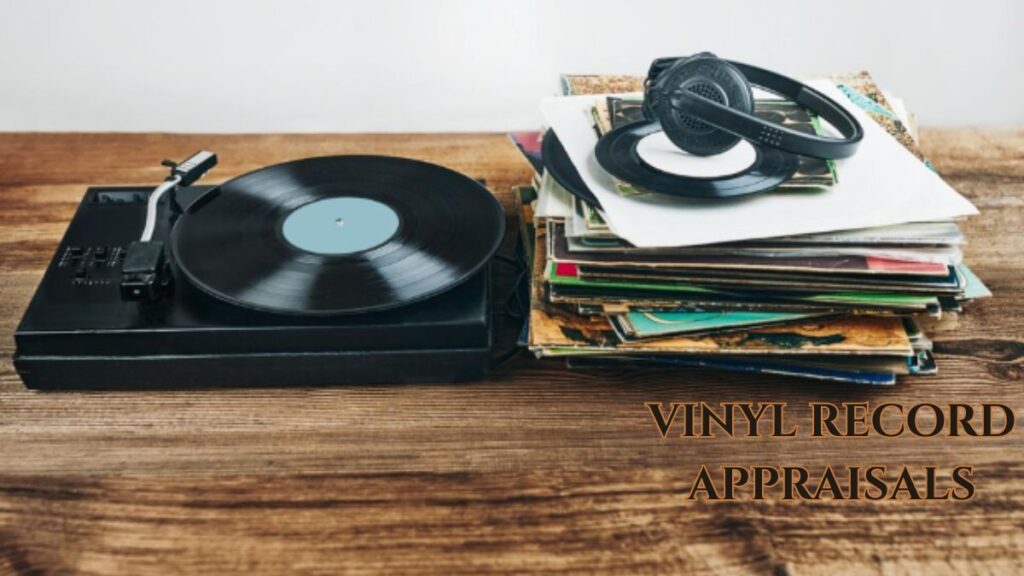Vinyl records have made a major comeback in recent years, not just for their nostalgic charm, but also for the surprising value some rare pressings can hold. Whether you inherited a collection from a family member or are an avid collector yourself, understanding the true worth of your records is crucial. This is where vinyl record appraisals come into play. Appraising vinyl records means evaluating their condition, rarity, demand, and pressing details to assign an accurate monetary value. For many, the process can seem confusing, but with the right knowledge, anyone can start to grasp the fundamentals of vinyl record valuation.
What Is a Vinyl Record Appraisal and Why Is It Important?
A vinyl record appraisal is the process of examining a record to determine its fair market value. Professional appraisers or experienced collectors take several elements into account, such as the record’s label, pressing date, physical condition, edition, and historical significance. Appraisals are important for several reasons. They help you know whether you own a valuable piece or a common item. This is essential when selling your collection, insuring it, donating it, or simply wanting to know its worth for personal satisfaction.
A vinyl appraisal is also useful when dealing with estate divisions, music history research, or setting up auctions. In all these cases, having a documented appraisal protects both the buyer and the seller from unfair deals.
What Makes a Vinyl Record Valuable?
Not every old record is worth hundreds or thousands of dollars. In fact, most vinyl records from the past few decades may hold more sentimental than monetary value. However, there are certain factors that can drastically increase a vinyl’s worth:
-
Rarity: The rarer a record is, the more likely it is to be valuable. For example, limited edition pressings, test pressings, or records that were withdrawn from production quickly often carry high value.
-
Condition: This is arguably the most important aspect of a record’s value. Collectors look at both the vinyl itself and the album cover (or sleeve). Scratches, warping, and worn-out covers can significantly reduce value.
-
Label and Pressing: First pressings or original labels usually fetch more money than re-releases. For instance, a first-pressing Beatles album on Parlophone is worth far more than a modern reissue.
-
Artist Popularity: Records from iconic artists like The Beatles, Elvis Presley, Pink Floyd, or Nirvana often command higher prices, especially for rare releases or promotional items.
-
Market Demand: Just like any market, the value of vinyl records fluctuates based on collector interest. Trends in music, pop culture, or anniversaries can increase demand for certain records.
Let’s look at a simplified comparison table to help understand how different factors impact vinyl record appraisals:
| Factor | High Value Impact | Low Value Impact |
|---|---|---|
| Pressing Date | First pressing (original release) | Later or modern reissues |
| Condition (Vinyl/Cover) | Mint or Near Mint (NM) | Poor or Fair condition |
| Rarity | Limited edition / Promotional / Test Press | Mass-produced records |
| Artist/Band | Highly sought-after musicians (Beatles, etc.) | Lesser-known or forgotten artists |
| Label & Matrix Numbers | Original label with correct matrix numbers | Generic or later pressing labels |
How to Get Your Vinyl Records Appraised
If you’re ready to get your records appraised, there are a few reliable ways to do so. The first step is to gather all the information about your records. This includes the artist’s name, album title, catalog number, label, release year, and matrix runout numbers (found etched into the vinyl near the center). Once you’ve gathered that information, you have a few options for the actual appraisal:
-
Professional Appraisers: Hiring a vinyl record expert or music memorabilia appraiser is often the most accurate route. These professionals have experience with pricing trends, rare editions, and evaluating condition properly.
-
Record Stores: Some independent record shops offer appraisal services or can give you a quick estimate of value. This is especially helpful if you’re planning to sell locally.
-
Online Vinyl Communities: Sites like Discogs, RateYourMusic, and Reddit’s vinyl forums allow you to post details and get opinions from seasoned collectors.
-
Vinyl Record Price Guides: There are many books and online resources that compile market values of specific records, often updated annually.
-
Auction Houses: If you suspect your record is extremely valuable, a music memorabilia auction house may be a great place to start. They not only appraise but also help you connect with buyers.
Digital Tools and Apps for Vinyl Record Appraisals
Technology has made vinyl record appraisals more accessible than ever. Many apps and websites now provide instant pricing, collection management, and community forums to help evaluate records. Some top-rated tools include:
-
Discogs: A global database for vinyl records. Just input your record details or scan a barcode (if available), and you’ll get a price range based on recent sales.
-
Vinyl Price Guide: This online tool pulls prices from various marketplaces to give you a ballpark estimate of your record’s value.
-
Popsike: Offers data from past eBay auctions, showing how much certain vinyl records sold for over time.
-
Goldmine Record Appraisal Guide: A popular printed guide and now also available in digital formats, it covers thousands of entries with historical pricing.
Tips for Maintaining the Value of Your Vinyl Records
If you want to preserve your vinyl collection and potentially increase its appraisal value in the future, taking good care of your records is crucial. Here’s a list of things you should always do:
-
Store records vertically in a cool, dry environment to avoid warping.
-
Use anti-static inner sleeves and protective outer covers for the jackets.
-
Handle records by the edges and label only—never touch the grooves.
-
Clean your records regularly with a microfiber cloth or vinyl-safe cleaner.
-
Avoid stacking records, as pressure can damage the grooves.
A well-maintained record not only sounds better but can also fetch a higher appraisal value. Appraisers immediately notice the care and preservation efforts taken by collectors.
When Should You Consider Vinyl Record Appraisals?
There are several situations where getting a vinyl record appraisal is not just helpful but essential. For instance, if you’re planning to sell part of your collection, knowing the actual worth can prevent you from underselling valuable pieces. Similarly, if you’re preparing your collection for insurance, accurate appraisal documentation ensures fair compensation in case of theft or damage.
Estate planning or inheritance situations also call for proper valuation. You might inherit a collection from a loved one and have no idea if the records are valuable or not. A vinyl record appraisal provides clarity and avoids future disputes or loss.
Appraisals are also valuable when trading records with other collectors, donating to museums or libraries, or participating in vinyl record fairs and exhibitions.
Common Mistakes People Make When Appraising Vinyl Records
Many people assume that old means valuable. This is far from the truth. A record from the 1960s may be worth $1 if it was mass-produced and kept in poor condition. Another common mistake is ignoring the importance of the sleeve or jacket. An album in mint condition but without its original cover can lose a significant portion of its value.
Another issue is trusting only one platform for pricing. For example, using Discogs alone without cross-checking with Popsike or eBay listings may give you an unrealistic expectation. Finally, relying on emotional value instead of market trends can lead to disappointment. Always remember: rarity, condition, and demand matter most in vinyl record appraisals.
Conclusion: Why Vinyl Record Appraisals Are Worth Your Time
Understanding the world of vinyl record appraisals opens up a new dimension of appreciation for collectors and music lovers. Whether you’re simply curious about your collection’s worth or planning to sell, a proper appraisal ensures that you get the true value of what you own. By learning the basics, using helpful tools, and seeking expert guidance when needed, you can navigate the world of vinyl records with confidence.
The growing interest in vintage music continues to make vinyl a hot collectible. With the right knowledge and care, your records could be worth more than just music—they could be a real asset.
So next time you come across an old box of vinyl in the attic or garage, don’t toss it away. Start your journey into vinyl record appraisals and you might just uncover a hidden musical treasure.
FAQs about Vinyl Record Appraisals
Q1: How do I know if my vinyl record is valuable?
The value of a vinyl record depends on several key factors including its rarity, condition, original pressing details, and demand in the market. First pressings, limited editions, or records from legendary artists usually carry higher value—especially if they are in excellent condition with the original cover and inserts intact.
Q2: Can I appraise my vinyl record collection at home?
Yes, you can perform a basic appraisal yourself using online tools like Discogs, Popsike, and Vinyl Price Guide. These platforms help you compare your record with similar ones that have been sold recently. However, for a professional and accurate appraisal, especially for large or rare collections, hiring a specialist or visiting a record appraisal service is recommended.
Q3: What details should I look for when evaluating my record?
Look for the catalog number, label information, pressing year, matrix/runout numbers, and the overall physical condition of both the vinyl and the cover. These details are crucial for determining the exact version and pressing of your record, which directly impacts its value.
Q4: Does the condition of the album cover affect the appraisal?
Absolutely. The condition of the cover—also called the sleeve—plays a significant role in vinyl record appraisals. A mint-condition cover with original inserts like posters, lyric sheets, or stickers can increase the value, while a torn, stained, or heavily worn cover can lower it considerably.
Q5: Are all old vinyl records valuable?
No, age alone does not make a vinyl record valuable. Many records from past decades were mass-produced and are still common today, which lowers their worth. It’s the combination of age, rarity, condition, and demand that determines value.







